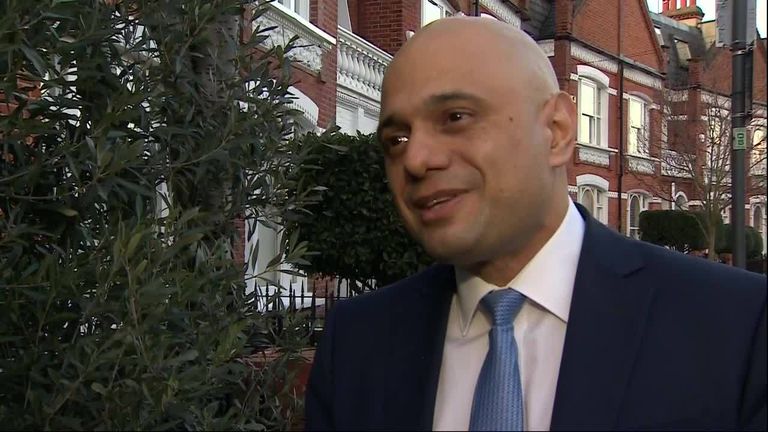Why Sajid Javid decided he'd rather walk than stay on as chancellor
Sajid Javid's departure is the big news, but the underlying theme is one of complete command and control from the centre.
Friday 14 February 2020 16:41, UK
It was billed as the "moderate" reshuffle. But it morphed into a major crisis just before midday when Sajid Javid refused the terms of his reappointment as chancellor and decided instead to quit No 11.
Told by Boris Johnson that the price of staying in the No 2 job in government meant getting rid of all his advisers, Mr Javid decided he'd rather walk.
It was a pointed power grab by Mr Johnson and his chief adviser Dominic Cummings to control the Treasury from No 10.
"No self-respecting minister would accept the conditions offered by the prime minister today," said Mr Javid as he bowed out of office. "I felt I was left with no option to resign."
The shock departure of the No 2 in government left the reshuffle looking rather chaotic.
Whatever the animosity between No 10 and No 11, the prime minister will not have wanted to lose his chancellor a month before he is due to deliver the budget heralding in "a decade of renewal".
The date of that budget is now up the air and the new man to deliver it is an inexperienced new chancellor, known for being capable but green.
:: Listen to All Out Politics on , , ,
But, as with all governments, the Treasury under Mr Javid was the source of an alternative power base in government and Whitehall and Mr Javid had flexed that power in clashes with Mr Johnson and Mr Cummings in recent months.
The chancellor had won a crucial battle on economic spending during the election, persuading the prime minister not to risk credibility by going too big on spending pledges.
He had also publicly gone into bat for HS2, briefings that No 10 railed against even though the actual project was this week given the green light.
In turn, the No 10 machine decided it wanted more control over the chancellor's operation: In that respect, the attempt to bind Mr Javid into a joint "economic delivery unit" of advisers run out of No 10 fitted the narrative of Mr Johnson's reshuffle.
Mr Javid's departure might have been the big news, but the underlying theme is one of complete command and control from the centre.
Absolute loyalty trumped all else.
Regardless of competence, experience, ability, ministers were moved aside if they were considered past or potential obstacles.
One cabinet source told me No 10 felt the now former Northern Ireland secretary Julian Smith did not loop them in enough - no matter that he was roundly praised by many - including Leo Varadkar - for his role in getting Stormont up and running.
Another said Andrea Leadsom's card had been marked ever since she ran against him for the leadership. A Brexiteer he re-appointed in July but who was now surplus to requirements.
Mr Javid himself was a great champion and advocate of Mr Johnson's "levelling up" agenda, but in the Johnsonian era there is no room for even a sliver of dissent.
As one cabinet minister put it to me soon after the news broke: "This is the right decision. You can't have the Treasury working at odds with No 10. This is a win-win. Boris either got him under control or got rid of him early."
Mr Johnson and his team wanted this to be a delivery cabinet and in some ways this is what he's created. His top team are left in no doubt that he expects total loyalty.
He has removed any barnacle, however small, from his cabinet boat and refreshed the top team.
There are some who will wonder if he has left some of the most able out of the team as the price for utter discipline.
That question will take some months to answer as the promises he made during the election on domestic policy and on Brexit have to be turned into policy and action.
There is also another question touched on in Mr Javid's resignation letter to the prime minister. Who speaks truth to power?
"It is crucial for the effectiveness of government that you have people around you who can give you clear and candid advice, as I have always sought to do," the former chancellor said.
"I would use you to ensure the Treasury as an institution retains as much credibility as possible."
Mr Johnson is a prime minister at the height of his authority, with a huge majority, a broken opposition and a mandate to re-shape Britain. He wants a team around him to execute it.
But there are some who caution that untrammeled power concentrated in No 10 may lead to bad decision making.
John McDonnell, the shadow chancellor, told Sky News that every government needed a strong Treasury.
"Why do you need a strong Treasury? Because someone has got to say 'is that policy properly costed?' You need a chancellor who can do that. You can't have a lap-dog there," he said.
Mr Javid's shock departure will dominate the coverage of a reshuffle that should have been billed as one looking towards how the country should be governed rather than how departments and cabinet ministers should be controlled.
But taking a tight grip on the Treasury will concentrate more power in Mr Johnson's hands in the coming year.
A cabinet created in his image, every single one his choice and his ally.
The deck reshuffled but only room for one king. But in time, there will be a prince.









